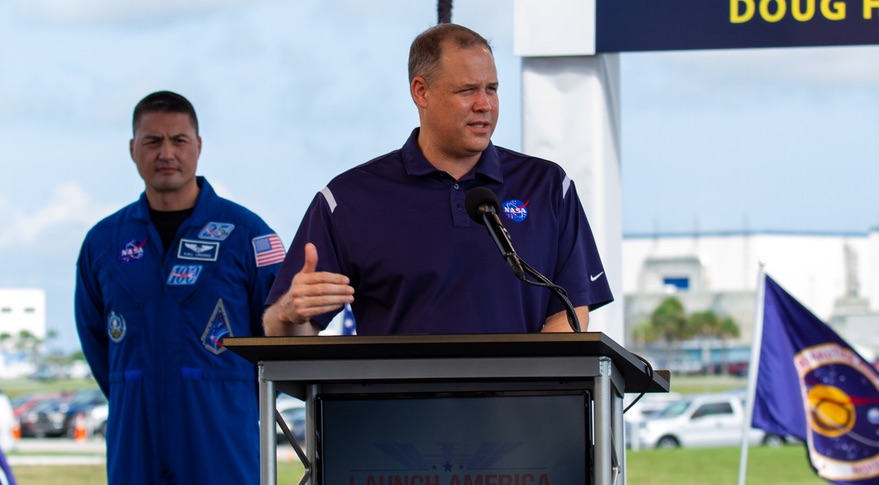WASHINGTON — The successful return of human orbital spaceflight to the United States generated bipartisan praise, but it’s unclear if that support will translate into funding required to enable other NASA human spaceflight ambitions.
While President Donald Trump’s presence at the May 30 launch of SpaceX’s Demo-2 commercial crew mission received attention, he was accompanied by Vice President Mike Pence, several members of the president’s cabinet, and nearly 20 members of Congress, according to the White House.
Among the members of that congressional delegation was Rep. Brian Babin (R-Texas), who is ranking member of the House Science Committee’s space subcommittee. “Seeing this first crewed flight take place is an incredible source of pride for me. For too long, we have been dependent on Russia to put Americans into space. That dependence ends today,” he said in a statement after the launch.
That delegation was dominated by Republicans, who were thanked individually by Trump in his remarks at the Kennedy Space Center after the launch. There were a few Democrats who also attended but were not mentioned by Trump in his speech, including Rep. Kendra Horn (D-Okla.), who chairs the space subcommittee.
“As the first launch of American astronauts on an American rocket from American soil in almost a decade, the Demo-2 mission marks a significant milestone for our nation’s human space flight program and commercial crew,” she said in a statement after launch. “I look forward to continued progress toward the certification of Crew Dragon for safe and routine transportation of NASA astronauts to the ISS.”
Others not at the launch weighed in, including former Vice President Joe Biden, the presumptive Democratic nominee for president. While Biden did not play a major public role in space policy while serving as President Barack Obama’s vice president, he did win praise by others, including former Sen. Bill Nelson (D-Fla.) and former NASA Administrator Charles Bolden, for his work winning initial support for commercial crew.
“This mission represents the culmination of work begun years ago, and which President Obama and I fought hard to ensure would become a reality,” Biden said in a statement after the launch. “We planted the seeds of today’s success during the 2009 Recovery Act, which according to NASA, has saved taxpayers up to $30 billion and invigorated an aerospace industry in Florida that accounts for more than 130,000 jobs in the state.” NASA used a portion of stimulus funding allocated by that act, passed in response to the 2008 financial crisis, for initial awards for technologies supporting commercial crew development.
Throughout the events before and after the Demo-2 launch, NASA Administrator Jim Bridenstine has walked a fine line, praising the Trump administration for its support for the agency while also emphasizing that NASA need bipartisan support to achieve its goals, as well as going out of his way to praise his predecessor, Bolden, for his work laying the groundwork for commercial crew.
“President Trump said, ‘We’re going to make space a priority,’” Bridenstine said in remarks after the launch to introduce Pence who, in turn, introduced Trump. “As a nation, America is again leading in space.”
At a press conference at the Johnson Space Center May 31, after the Crew Dragon spacecraft docked with the ISS, Bridenstine noted that the agency was seeking nearly $3 billion more in fiscal year 2021 than it received in 2020, primarily for programs linked to the administration’s goal of landing humans on the moon by 2024.
“Our budgets are going up. They’re going up rapidly. My job is to make sure that we have the bipartisan, apolitical support to achieve these objectives, and so far we have been able to do that,” he said.
The funding outlook for fiscal year 2021, though, remains uncertain. The coronavirus pandemic has stalled the standard appropriations process given the focus on bills to provide economic relief as well as disruptions to the overall legislative process. Neither House nor Senate appropriators have taken up spending bills for 2021, or scheduled hearings to discuss NASA’s budget request.
In a May 29 statement, House Majority Leader Steny Hoyer (D-Md.) said the House would spend June primarily doing committee work. The House Appropriations Committee, he said, “will continue to hold necessary COVID-19 oversight hearings before beginning subcommittee and full-committee markups at the end of June and beginning of July.”
